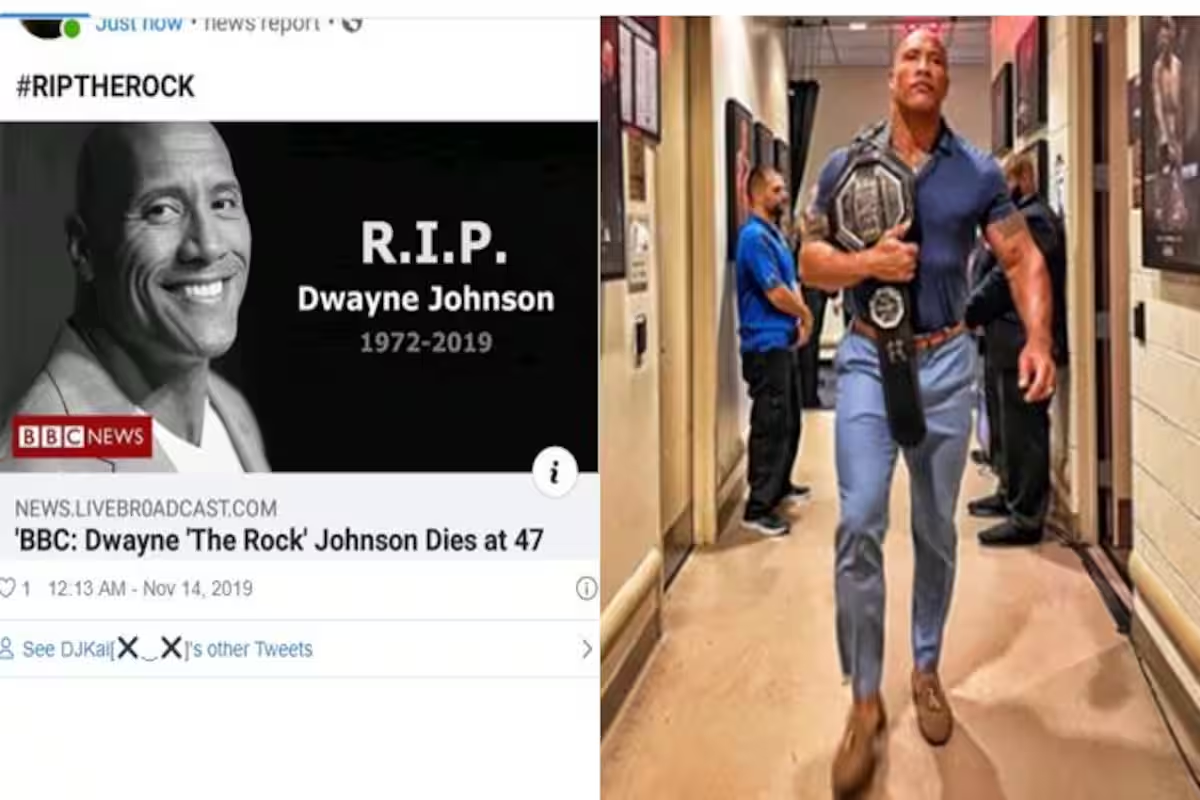Did The Rock Die? Unraveling The Viral Death Hoax
The internet, a powerful conduit for information, can sometimes become a breeding ground for misinformation. Few topics spread faster, or cause more widespread concern, than news of a beloved celebrity's passing. This was precisely the case recently when rumors began to circulate, leading many to ask: did The Rock die? The answer, unequivocally and fortunately for his millions of fans worldwide, is a resounding no. Dwayne "The Rock" Johnson is very much alive, continuing to dominate both the silver screen and the world of social media with his unparalleled charisma and work ethic.
The swift spread of these false reports highlights a pervasive issue in our digital age: the viral nature of celebrity death hoaxes. These fabricated stories, often designed to shock and gain clicks, can cause genuine distress among fans and lead to widespread confusion. This article aims to set the record straight, providing clear, factual information about Dwayne Johnson's current status, delving into the history of these hoaxes, and offering insights into how to navigate the complex landscape of online news.
Table of Contents
- The Persistent Rumor: Did The Rock Die?
- A History of Hoaxes: The Rock's Unfortunate Target
- Dwayne "The Rock" Johnson: A Biography
- Personal Data: Dwayne "The Rock" Johnson
- The Truth Revealed: He's Very Much Alive!
- Why Do These Hoaxes Spread? Understanding the Mechanism
- The Broader Context: Celebrity Death Hoaxes
- Protecting Yourself from Misinformation
The Persistent Rumor: Did The Rock Die?
News of actor Dwayne Johnson’s death spread quickly earlier this week, causing significant concern among fans across the world. The alarming reports, which flooded social media platforms, specifically targeted the beloved star, leading many to genuinely question: did The Rock die? These rumors often gain traction through deceptive tactics, making them appear legitimate at first glance. One particularly convincing piece of misinformation was a link shared on Facebook, which allegedly showed a BBC News video claiming that actor Dwayne “The Rock” Johnson had died in a stunt accident. This fake video garnered more than 1.6 million views, a testament to how quickly and widely such hoaxes can disseminate across the internet.
The fabricated narratives often include specific, yet entirely false, details to lend them an air of credibility. For instance, the mention of a "June 2025 report" being "confirmed" is a classic tactic used by hoax creators to make their fake news seem more official or to imply a long-standing, verifiable claim. In reality, such reports are entirely baseless, designed solely to ensnare unsuspecting readers. Thousands of unsuspecting fans, caught in the emotional whirlwind of believing their idol might be gone, shared the fake news, inadvertently amplifying the misinformation. This rapid sharing highlights the vulnerability of social media users to sensationalized content, especially when it concerns public figures they admire.
A History of Hoaxes: The Rock's Unfortunate Target
Dwayne ‘The Rock’ Johnson has, unfortunately, become a frequent target of viral death hoaxes. This isn't the first time his life has been falsely reported as ended. In November 2019, a similar death hoax claimed that he had passed away, causing a similar wave of shock and confusion among his fanbase. These recurring false reports demonstrate a pattern where certain high-profile celebrities are repeatedly chosen as subjects for these malicious online campaigns. The sheer volume of his public appearances and his continuous output in film and television should, in theory, make such hoaxes easily debunkable, yet they persist.
The nature of these hoaxes often involves dramatic and tragic scenarios to maximize their impact. One recurring theme in the false reports about Johnson has been claims of his death during a stunt accident. For instance, a fake news story circulated that he had been killed in a stunt gone wrong while filming a project. This narrative plays on the inherent dangers associated with action movie roles, making the fictional scenario seem plausible to a casual observer. The creativity of these hoax creators in crafting believable, albeit false, narratives is a significant factor in their spread. They tap into public interest and concern, weaponizing it for clicks and potentially other nefarious purposes.
Dwayne "The Rock" Johnson: A Biography
To truly understand the impact of these hoaxes, it's essential to appreciate the life and career of the man at their center. Dwayne Douglas Johnson, born on May 2, 1972, is an American actor and professional wrestler, universally known by his iconic ring name, The Rock. His journey to global superstardom is a testament to his immense talent, unwavering work ethic, and undeniable charisma. From the wrestling ring to the silver screen, Johnson has built an empire based on genuine connection with his audience and a relentless pursuit of excellence.
Early Life and Wrestling Career
Born into a family of wrestlers, including his grandfather Peter Maivia and father Rocky Johnson, Dwayne was destined for greatness in the squared circle. After a brief college football career, he transitioned to professional wrestling, making his debut in the then-WWF (now WWE) in 1996. Initially struggling to connect with audiences, he reinvented himself as "The Rock," a charismatic, trash-talking, eyebrow-raising superstar. His electrifying promos and athletic prowess quickly made him one of the most popular wrestlers of all time. He achieved multiple championships, headlined numerous pay-per-views, and became a household name, laying the groundwork for his future endeavors.
Transition to Hollywood Stardom
The Rock's natural charisma and larger-than-life persona proved to be a perfect fit for Hollywood. He made his acting debut in "The Mummy Returns" (2001) and soon landed his first leading role in "The Scorpion King" (2002). From there, his film career exploded. He has starred in numerous blockbuster franchises, including "Fast & Furious," "Jumanji," and "Moana" (as the voice of Maui). His ability to seamlessly blend action, comedy, and genuine emotional depth has made him one of the highest-grossing and most bankable actors in the world. As of 2023, he continues to dominate the entertainment industry with his charisma, talent, and work ethic, constantly appearing in new projects and maintaining a significant presence across various media platforms.
Personal Data: Dwayne "The Rock" Johnson
To further solidify the factual basis of this article and provide readers with verified information about the subject of these persistent hoaxes, here is a quick overview of Dwayne "The Rock" Johnson's personal and professional data:
| Category | Detail |
|---|---|
| Full Name | Dwayne Douglas Johnson |
| Ring Name | The Rock |
| Date of Birth | May 2, 1972 |
| Age (as of 2023) | 51 years old |
| Place of Birth | Hayward, California, U.S. |
| Nationality | American |
| Occupation | Actor, Professional Wrestler, Businessman |
| Active Years | 1996–present (Wrestling), 2001–present (Acting) |
| Status (as of Oct 2023) | Alive and Well |
The Truth Revealed: He's Very Much Alive!
Despite the vibrant career and constant public presence, Dwayne “The Rock” Johnson has been a victim of false death reports circulating on the internet. However, the definitive answer to the question, did The Rock die, is a categorical no. Contrary to the rumors, The Rock is very much alive and thriving. Major news outlets have confirmed that he is alive and well, actively engaged in his various projects and public life. His public appearances and movie releases further prove that he is still active in the industry, making new films, promoting his ventures, and engaging with his massive fan base.
As of October 2023, Dwayne Johnson is alive and well, continuing to dominate both the silver screen and the world of social media. His recent posts, interviews, and project announcements serve as undeniable proof of his vitality. Fans can rest assured that their beloved idol is not only alive but also continuing to build upon his impressive legacy in entertainment and beyond. The persistent nature of these hoaxes serves as a stark reminder of the need for media literacy and critical evaluation of information found online.
Why Do These Hoaxes Spread? Understanding the Mechanism
The rapid dissemination of celebrity death hoaxes, like the one questioning if did The Rock die, can be attributed to several factors inherent in the digital age. Firstly, social media platforms are designed for rapid sharing, often prioritizing virality over veracity. A sensational headline or a shocking piece of news, even if false, can quickly gain momentum as users share it without verifying its authenticity. Thousands of unsuspecting fans shared the fake news, propelled by genuine concern or the desire to be the first to report breaking (albeit false) news.
Secondly, these hoaxes often prey on emotional responses. The news of a beloved celebrity's death evokes strong feelings of sadness, shock, and disbelief, which can override critical thinking. People are more likely to share emotionally charged content, especially when it pertains to figures they admire. Furthermore, some hoaxes employ sophisticated tactics to appear credible. The mention of "Friends and family gathered at the O'Reilly's Auto Parts parking lot Monday evening to remember Dwayne Johnson and make sure their calls for justice are heard" is an example of a fabricated detail designed to add a layer of realism and urgency to the false narrative. This specific detail, though seemingly mundane, attempts to ground the hoax in a tangible, relatable event, making it harder for the average person to immediately dismiss as fake. This highlights the insidious nature of misinformation, which often blends small, believable details with grand, false claims to create a convincing illusion.
The Broader Context: Celebrity Death Hoaxes
The case of Dwayne "The Rock" Johnson is far from isolated. Celebrity death hoaxes are a recurring phenomenon, affecting stars across various industries globally. Several fake news stories about celebrities, including those from the Hindi film industry, have circulated in the past, falsely announcing their passing. These hoaxes often follow a similar pattern: a fabricated report appears on the internet, often citing a dramatic cause of death like an accident or sudden illness, and then spreads like wildfire across social media platforms and less reputable news sites.
This persistent trend serves as a crucial reminder of the pervasive nature of misleading information circulating on the internet. It underscores the importance of media literacy and critical thinking in an era where anyone can publish information, regardless of its accuracy. Beyond causing emotional distress to fans and the celebrities themselves, these hoaxes contribute to a broader erosion of trust in online information. When false news goes viral, it becomes harder for individuals to distinguish between genuine reports and malicious fabrications, potentially desensitizing the public to real news and making them more susceptible to harmful disinformation campaigns on more critical topics.
Protecting Yourself from Misinformation
In an age where misinformation can spread globally in seconds, it is imperative for every internet user to adopt strategies for verifying information, especially when it concerns sensitive topics like a celebrity's death. Here are key steps to protect yourself and others from falling victim to and spreading hoaxes:
- Check Multiple Reputable Sources: Before believing or sharing any news, especially something as shocking as a celebrity death, consult established and reputable news organizations. Major news outlets will always verify such significant events through official channels before reporting them. If only one obscure source is reporting it, it's likely false.
- Be Skeptical of Sensational Headlines: Hoaxes often use clickbait headlines designed to evoke strong emotions and encourage immediate sharing. If a headline seems too unbelievable, too dramatic, or too good/bad to be true, it probably is.
- Examine the Source: Look beyond the headline. Who published the article? Is it a known, credible news organization, or a suspicious-looking website with a strange URL? Check the "About Us" section of the website.
- Look for Official Statements: For celebrity news, official statements from the celebrity's representatives, family, or official social media accounts are the most reliable sources. If there's no official confirmation, be wary.
- Reverse Image Search: Sometimes hoaxes use old or unrelated images to make their stories seem real. A reverse image search can reveal the original context of a photo.
- Consider the Date: Some hoaxes are recycled old news. Check the publication date of the article.
- Think Before You Share: The most crucial step. Every share amplifies the reach of misinformation. If you're unsure, don't share. It's better to be a responsible consumer of information than an unwitting spreader of falsehoods.
By adopting these practices, you contribute to a more informed and trustworthy online environment, helping to curb the spread of harmful hoaxes and ensuring that the truth prevails.
Conclusion
The question, "did The Rock die?", has been definitively answered: no, he has not. Dwayne "The Rock" Johnson is alive and well, continuing to be a vibrant force in the entertainment industry. The recent viral death hoax, like many before it, serves as a powerful reminder of the challenges posed by misinformation in our interconnected world. These fabricated stories not only cause unnecessary distress to fans and the individuals targeted but also highlight the ease with which false narratives can spread across digital platforms.
It is imperative for all of us to cultivate a critical approach to the news we encounter online. Always verify information from multiple reputable sources before accepting it as truth or, more importantly, before sharing it with others. By doing so, we can collectively combat the spread of misinformation and ensure that accurate, reliable information is what truly goes viral. Let's continue to celebrate Dwayne "The Rock" Johnson's incredible career and life, while remaining vigilant against the deceptive tactics of online hoaxes. What are your thoughts on how these hoaxes spread so quickly? Share your experiences and tips in the comments below, and consider exploring other articles on our site that delve into media literacy and celebrity news.



Detail Author:
- Name : Earline Langosh PhD
- Username : ortiz.maureen
- Email : dgrady@moore.biz
- Birthdate : 1978-12-07
- Address : 42003 Kristofer Route Apt. 960 Doviefurt, MA 78529-5278
- Phone : 1-480-743-0138
- Company : Hoeger-Skiles
- Job : Mining Engineer OR Geological Engineer
- Bio : Quas asperiores esse qui odit aut inventore adipisci. Enim reprehenderit dolor dolorum sint ad nihil. Qui debitis et non aperiam explicabo dolorum.
Socials
tiktok:
- url : https://tiktok.com/@ewaters
- username : ewaters
- bio : Eaque rerum dolore et est praesentium at. Consectetur cum et ea incidunt.
- followers : 2409
- following : 2167
instagram:
- url : https://instagram.com/erinwaters
- username : erinwaters
- bio : Doloribus esse sequi corrupti sit ut. Sequi nemo vel exercitationem quibusdam ullam optio iure.
- followers : 1235
- following : 1428
linkedin:
- url : https://linkedin.com/in/erin9308
- username : erin9308
- bio : Sit expedita neque et dolorem et.
- followers : 4306
- following : 802